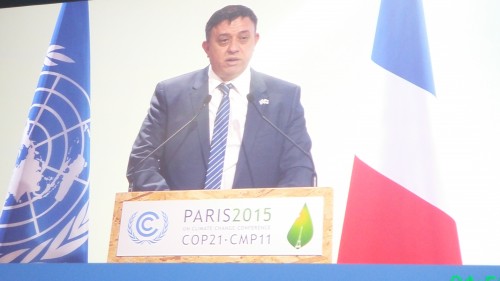The Minister of Environmental Protection, Avi Gabbay, participated yesterday (Monday) at noon in the meeting of the heads of delegations to the climate conference in Paris. The meeting was attended by heads of state, ministers and representatives from delegations to the conference from the countries that are members of the convention.

The Minister of Environmental Protection, Avi Gabbay, participated yesterday (Monday) at noon in the meeting of the heads of delegations to the climate conference in Paris. The meeting was attended by heads of state, ministers and representatives from delegations to the conference from the countries that are members of the convention.
These are the words of Minister Gabai who represents Israel: "Three weeks have passed since the terrorist attack in Paris. An attack against liberty and freedom, values that the French Revolution instilled in our culture. I send you my condolences, in my name and in the name of the citizens of Israel. I was here at the conference last week, I heard a lot of speeches and I guess there is not much to update about the importance of the climate challenges. Therefore, I will focus on the Israeli plan:
Some data: our population is about 8 million inhabitants; Our gross domestic product is $38,000 per capita and growing at nearly 3% per year; Our share of greenhouse gas emissions is only 0.2%. Not particularly significant.
The target decided upon by the Israeli government is a 24% reduction in greenhouse gas emissions with reference to a business as usual scenario. Our plan is to achieve the goal by five steps:
1. Reducing electricity consumption by 17%
2. Electricity production from renewable energy will be at least 17% of the total electricity consumption (currently we are at 2%)
3. Reducing the use of coal
4. Reducing private travel by 20%
5. Adoption of breakthrough technology that will change the world as we know it today.
I joined politics about a year ago after 20 years of experience in the telecom sector. I experienced the dramatic change brought by technology in the telecom sector. No one could have predicted the technological development. I have seen how smart strategies collapse under new and breakthrough technologies. That is why I am very optimistic about our ability to achieve the goals that we have set for him.
Israel is called the "startup nation" We have more than 350 cleantech companies and last year we were ranked first out of 40 countries in the development of cleantech technologies. Developing technologies is our contribution and our main mission when it comes to climate challenges.
If you are not optimistic about the world's goals, close your eyes and imagine what it will look like in 2030:
1. The electricity grid will be much more efficient thanks to developments in the smart grid field
2. Many of us will produce the energy we will consume ourselves
3. All factories will use congress (production of electricity and useful heat at the same time)
4. Automobile companies will produce more electric cars than gasoline-powered vehicles
5. Public transportation will be smarter and more efficient
"Is it possible to achieve the goal we have set, to prevent a global increase of more than 2 degrees Celsius by 2100?
I'm sure it is. It's in our hands."

One response
Enormous is the challenge facing the world. 2030 is already here. But it's okay to dream. Dreams are the ones that have changed the face of the world throughout history. The problem is that there is not that much time to give a chance and see if market forces will take us there. The deep change must come with a strong rudder breaking by the governments towards R&D. Efficiency of 20% in renewable energies is poor. It took 100 years to increase in conventional production from such an efficiency to an efficiency of 60%. (40% and more are still wasted). We don't have 100 years to wait. Need to move and now!!!!